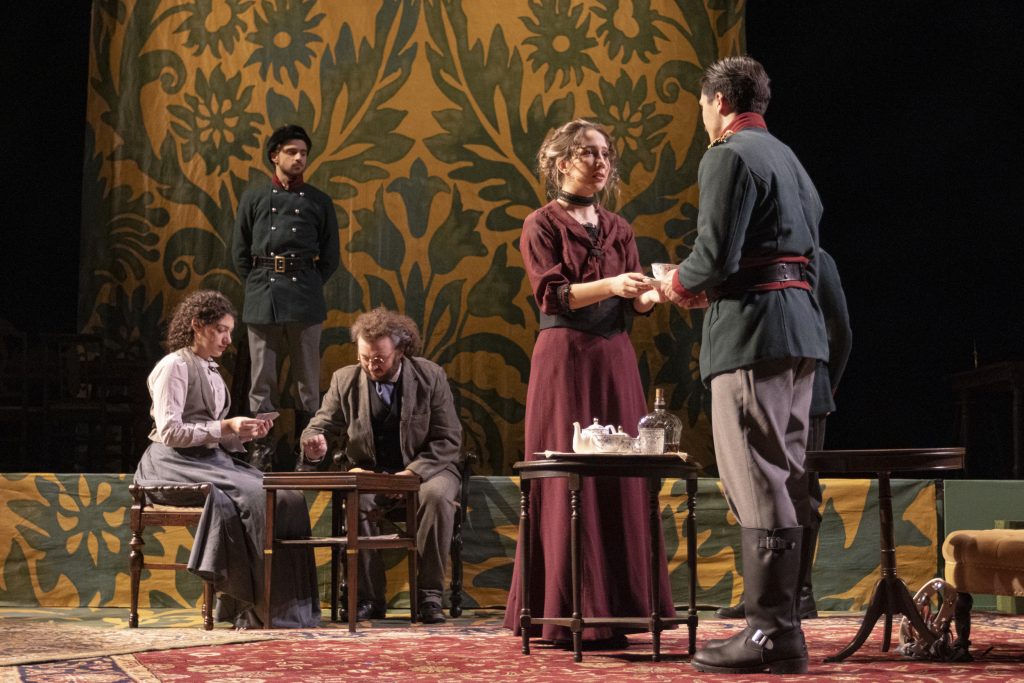Binghamton University’s theatre department brought comedy and tragedy to the Watters Theater stage in the Anderson Center this past weekend with their rendition of “Three Sisters.”
Anton Chekhov’s “Three Sisters” — a play set in early 20th century Russia — revolves around the wealthy Prozorov siblings, including sisters Olga, Masha and Irina along with their brother Andrei. Having grown up in Moscow, the sisters dream of leaving the provincial town in which they reside to chase their dreams and return to the happiness they once shared in their home city.
The play is full of twists and turns, complex characters and relationships and the respective hopes and dreams that drive them. However, the characters grapple with appreciating what is in front of them, as well as the harsh reality that some things in life are simply unattainable.
Directed and adapted by Will Pomerantz, 61, of New York City, a guest at BU for the production, the play was slightly restructured to provide a more modern adaptation for a contemporary audience to understand. This included dialogue that was more natural for the actors, as well as leaning into certain comedic aspects while staying true to the original meaning of Chekhov’s masterpiece.
A portion of the proceeds from the production will be donated to Direct Relief to assist in Ukraine. Pomerantz, in his director’s notes, discussed the question “Why Chekhov Now?” in reference to the ongoing war in Ukraine.
“As we approach the second anniversary of Russia’s brutal and unprovoked invasion of the sovereign nation of Ukraine, and the one-week anniversary of the murder of Alexei Navalny, it is a reasonable question to ask,” Pomerantz wrote. “Ukraine, contrary to what the brutal Putin regime would have you believe, has a long and unique cultural history, including its own language. In spite of Russia’s multiple attempts to subsume this nation over the centuries, the Ukrainian culture has endured, and I believe that we, as Americans, should do whatever we can to support Ukraine’s valiant resistance to a Russian takeover.”
Pomerantz also discussed his reasoning behind choosing a Chekhov work in light of current events, the importance of distinguishing between Chekhov and living Russian artists who refuse to denounce the war in Ukraine and the values that Chekhov held and incorporated into his works.
“I would respectfully ask that members of this community not judge or dismiss [Chekhov] out of hand simply based on his nationality,” Pomerantz wrote. “But allow yourself to experience the breadth of experience this writer was able to bring to his work, creating plays that contain so much humanity. It is this shared humanity that despots and would-be despots try to make us forget, using fear and hatred to divide us.”
Sarah Ulmer, a sophomore majoring in psychology and who played the role of Masha, discussed her experience with Chekhov’s works and further highlighted the humanity they embody.
“I have never been taught about his plays prior to doing this show, but once [Pomerantz] introduced it to us I really admired the way Chekhov goes about his plays,” Ulmer said. “It’s like the epitome of laughing and crying at the same time, and it’s so perfect and paradoxical. It feels really human.”
In addition, the production featured an elaborate set, incorporating the stage elevators that have not been used in years. The play was also moved forward into the theatre space to create a more intimate atmosphere.
Taylor Denning, a senior double-majoring in biochemistry and English and stage manager for the play, discussed her favorite technical aspect.
“I love the ending,” Denning said. “It’s this really big sound cue, elevator, rail … all of these sound cues come together and all the curtains fall away, so you can see the back of the theatre and it reveals that everything’s a performance.”
Justin Salas, a senior majoring in art and design, made his acting debut as Vershinin, an army commander who begins an affair with Masha. Salas discussed the ways in which he relates to his character.
“I think I really ended up resonating with Vershinin and the way he views the world,” Salas said. “Not a lot of the things that he does and the actions that he takes over the course of the play, but I think just his fervor for life and his general philosophical nature about the future and the hope of the world.”
Salas went on to express his gratitude for his fellow cast members.
“If it wasn’t for them, I don’t think I would’ve been able to portray the character in the same way that I did,” Salas said. “They’re all so incredible, and I think every single one of them is a better actor than I am. Throughout the whole process I felt like I was running to catch up to where they were … but everyone is just so kind, friendly and willing to share what they know. They’re also amazing actors.”
The audience was extremely responsive to the humor, tragedy and plot twists portrayed by the actors — contributing to a production full of crying, laughter, gasps and applause from spectators.
Jaqueline Justo, a junior majoring in environmental science and an attendee, commented on her favorite aspect of the play.
“I really love how all the actors got into their roles and really brought it to life,” Justo said. “I like to describe it as sort of [like] watching a living painting.”
Ulmer reflected on the meaning of Chekhov’s “Three Sisters.”
“The overarching message … is reaching for things that you may not get, [and] desiring things that you can’t have,” Ulmer said. “But nonetheless, the things that you do have, like the sisters — that relationship that they have together makes them so strong. I love my siblings coming to see it because it’s just such a family message at the same time among the misery, you know, at least they have each other.”
To read the full director’s notes visit this website.



